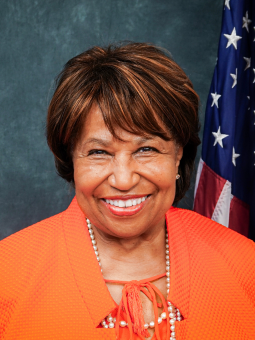
Carol Elizabeth Moseley Braun, also sometimes Moseley-Braun, is an American diplomat, politician, and lawyer who represented Illinois in the United States Senate from 1993 to 1999. Prior to her Senate tenure, Moseley Braun was a member of the Illinois House of Representatives from 1979 to 1988 and served as Cook County Recorder of Deeds from 1988 to 1992. She was elected to the U.S. Senate in 1992 after defeating Senator Alan J. Dixon in a Democratic primary. Moseley Braun served one term in the Senate and was defeated by Republican Peter Fitzgerald in 1998.

Ann Margaret Veneman is an American attorney who served as the fifth executive director of UNICEF from 2005 to 2010. She previously served as the 27th United States secretary of agriculture from 2001 to 2005. Veneman served for the entire first term of President George W. Bush, and she left to take the UNICEF position. Appointed by the U.N. Secretary-General Kofi Annan on January 18, 2005, she took over the post on May 1, 2005. A lawyer, Veneman has practiced law in Washington, DC and California, including being a deputy public defender. She has also served in other high-level positions in both the state and the federal government of the United States, including being appointed secretary of the California Department of Food and Agriculture, serving from 1995 to 1999, as well as United States deputy secretary of agriculture, serving from 1991 to 1993. Throughout her public career, Veneman was the first woman to serve in a number of positions, including secretary of agriculture, deputy secretary of agriculture, and California's secretary of food and agriculture. She was also just the second woman to lead UNICEF, following her predecessor, Carol Bellamy.
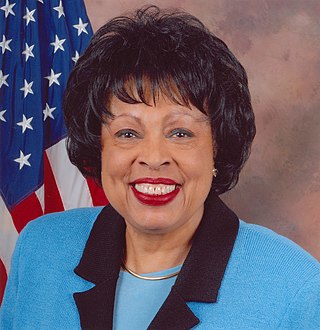
Diane Edith Watson is a former American politician who served as US Representative for California's 33rd congressional district, serving from 2003 until 2011, after first being elected in the 32nd District in a 2001 special election. She is a member of the Democratic Party. The district is located entirely in Los Angeles County and includes much of Central Los Angeles, as well as such wealthy neighborhoods as Los Feliz.

Clayton Keith Yeutter, ONZM was an American politician who served as United States secretary of agriculture under President George H. W. Bush from 1989 to 1991 before serving as counselor to the president in 1992. He served as United States trade representative from 1985 to 1989 and as chairman for the Republican National Committee from 1991 until 1992. Yeutter was employed as a senior advisor at the international law firm Hogan Lovells in Washington, D.C. He additionally founded the Clayton Yeutter Institute of International Trade and Finance at his alma mater, the University of Nebraska–Lincoln. The university subsequently published his biography, Rhymes with Fighter.

The domestic policy of the George W. Bush administration was the domestic policy of the United States from 2001 to 2009 while George W. Bush was president. Bush's main domestic policy advisors include Chairman of the Council of Economic Affairs Edward Lazear, Rob Portman, director of the Office of Management and Budget; U.S. Secretary of Labor Elaine Chao, Vice President Dick Cheney; U.S. Secretary of the Treasury Henry Paulson; U.S. Secretary of Commerce Carlos Gutierrez; U.S. Secretary of Health and Human Services Michael O. Leavitt and Allan Hubbard, director of the National Economic Council.

The Presidential Advisory Council on HIV/AIDS (PACHA) advises the White House and the Secretary of Health and Human Services on the US government's response to the AIDS epidemic. The commission was formed by President Bill Clinton in 1995 and each president since has renewed the council's charter.

James David Watkins was a United States Navy admiral and former Chief of Naval Operations who served as the United States Secretary of Energy during the George H. W. Bush administration, also chairing U.S. government commissions on HIV/AIDS and ocean policy. Watkins also served on the boards of various companies and other nongovernmental organizations and as the co-chair of the Joint Ocean Commission Initiative.

The United States President's Emergency Plan For AIDS Relief (PEPFAR) is a United States governmental initiative to address the global HIV/AIDS epidemic and help save the lives of those suffering from the disease. Launched by U.S. President George W. Bush in 2003, as of May 2020, PEPFAR has provided about $90 billion in cumulative funding for HIV/AIDS treatment, prevention, and research since its inception, making it the largest global health program focused on a single disease in history until the COVID-19 pandemic. PEPFAR is implemented by a combination of U.S. government agencies in over 50 countries and overseen by the Global AIDS Coordinator at the United States Department of State. As of 2023, PEPFAR has saved over 25 million lives, primarily in sub-Saharan Africa.

Barbara Pierce Bush is an American activist. She co-founded and is the chair of the board of the nonprofit organization Global Health Corps. She and her fraternal twin sister, Jenna, are the daughters of the forty-third U.S. president, George W. Bush, and former first lady, Laura Bush. She is also a granddaughter of former president George H. W. Bush and former first lady Barbara Bush, after whom she is named.
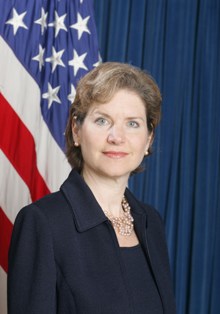
Susan Carol Schwab is an American politician, who served under President George W. Bush as United States Trade Representative from June 2006 to January 2009. She is not related to Charles R. Schwab Sr., founder of the Charles Schwab Corporation; she is also not to be confused with his first wife Susan (Cotter) Schwab.

The President's Council of Advisors on Science and Technology (PCAST) is a council, chartered in each administration with a broad mandate to advise the president of the United States on science and technology. The current PCAST was established by Executive Order 13226 on September 30, 2001, by George W. Bush, was re-chartered by Barack Obama's April 21, 2010, Executive Order 13539, by Donald Trump's October 22, 2019, Executive Order 13895, and by Joe Biden's February 1, 2021, Executive Order 14007.

Bob Hattoy was an American activist on issues related to gay rights, AIDS and the environment.

Kay Coles James is an American public official who served as secretary of the Commonwealth of Virginia from January 2022 to August 2023, and as the director for the United States Office of Personnel Management under President George W. Bush from 2001 to 2005. Previous to the OPM appointment, she served as Virginia secretary of health and human resources under then-Governor George Allen and was the dean of Regent University's government school. She is the president and founder of the Gloucester Institute, a leadership training center for young African Americans.
The Office of National AIDS Policy, established under President Clinton in 1993, coordinates the continuing domestic efforts to implement the President's National HIV/AIDS Strategy. In addition, the office works to coordinate an increasingly integrated approach to the prevention, care and treatment of HIV/AIDS. As a unit of the Domestic Policy Council, the Office of National AIDS Policy coordinates with other White House offices. It is led by a director, who is appointed by the president.
Scott Evertz operates a governmental and international affairs consulting practice in Washington, DC. He advises private sector and non-governmental organizations on health policy and political strategies. Previously, he was Vice President for International Affairs, OraSure Technologies. Prior to that, he was the Director of the White House Office of National AIDS Policy, first started by Bill Clinton, and was appointed by George W. Bush. He was the first openly gay individual appointed to a political position by a Republican President in history, causing significant controversy among the party's social conservatives.

James Wilson Holsinger Jr., is an American physician. A former major general in the U.S. Army Reserve, he has worked primarily in public health for over thirty years. He served as the Under Secretary of Veterans Affairs for Health from 1990 to 1993, during the administrations of George H. W. Bush and Bill Clinton. From 1994 to 2003, Holsinger was the Chancellor of the University of Kentucky's Chandler Medical Center. From 2003 to 2005 he served as Kentucky's Secretary of Health and Family Services.
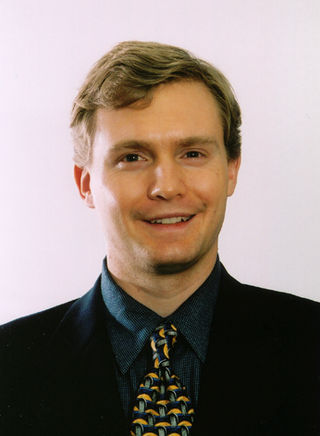
William Raymond Steiger is a Public Policy Fellow at the Wilson Center in Washington, D.C.. He served as Chief of Staff at the United States Agency for international Development from 2017 to 2021. Previously, Steiger was the chief program officer at Pink Ribbon Red Ribbon, an organization affiliated with the George W. Bush Institute, which works to reduce deaths from cervical cancer and breast cancer in low- and middle-income countries. He was the Special Assistant to the Secretary for International Affairs and the Director of the Office of Global Health Affairs at the U.S. Department of Health and Human Services (DHHS) during the George W. Bush administration, with a portfolio that included HIV/AIDS, malaria, avian flu and pandemic-influenza preparedness.
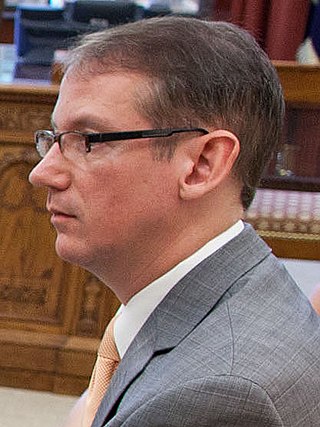
Jeffrey S. Crowley is best known as a member of the Domestic Policy Council in the administration of U.S. President Barack Obama as the director of the Office of National AIDS Policy (ONAP) from 2009 to 2011, tasked with coordinating the U.S. government's efforts regarding HIV/AIDS prevention, treatment and care and developing the National HIV/AIDS Strategy.
The U.S. National Commission on AIDS was established by a statute enacted November 4, 1988, with the aim of "promoting the development of a national consensus on policy concerning acquired immune deficiency syndrome [AIDS]". It produced several reports over the next 4 years.
















